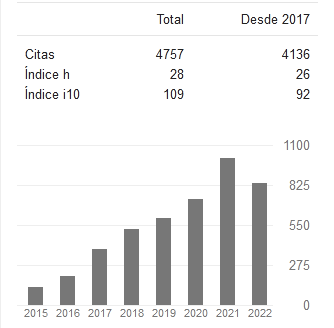LA EVALUACIÓN DE LA CALIDAD EN LA EDUCACIÓN A DISTANCIA
Palabras clave:
evaluación, calidad, educación, distanciaResumen
Las crecientes necesidades de formación de recursos humanos han hecho que modalidades educativas, como la educación a distancia, emerjan con programas flexibles que se adaptan a las necesidades particulares de diversos sectores de la sociedad. Los avances en las tecnologías de información y comunicación han favorecido también la proliferación de programas bajo esta modalidad, haciendo posible que muchos cursos se impartan sin que profesores y alumnos coincidan en un mismo espacio y a un mismo tiempo. Pero, ¿las diversas ofertas educativas tienen una calidad equiparable?; ¿qué es lo que hace que un programa de educación a distancia tenga mayor calidad que otros? Esta ponencia se orienta al tema de la calidad en la educación a distancia, proponiendo un modelo de cuatro factores para su evaluación: (1) la calidad en los procesos de diseño e impartición de un curso a distancia; (2) el aprendizaje como indicador de la calidad final del proceso educativo; (3) la satisfacción de los alumnos con los servicios de educación a distancia; y (4) la existencia de una cultura de calidad dentro de cada institución.
Descargas
Citas
Centre for Educational Research and Innovation. (2001). E–learning: The partnership challenge. París, Francia: OECD.
International Association for the Evaluation of Educational Achievement. (s.f.). Home page. Recuperado el 10 de abril de 2003, de http://www.iea.nl/
International Data Corporation. (2001, Abril 26). eLearning is burgeoning. Recuperado el 10 de abril de 2003, de http://www.idc.com/getdoc.jhtml?containerId=ebt20010426 Knowles, M. S., Holton, E. F., & Swanson, R. A. (1998). The adult learner: The definitive classic in adult education and human resource development. Houston, TX, EE.UU.: Gulf.
Llórens, F. J. y Fuentes, M. del M. (2000). Calidad total: Fundamentos e implantación. Madrid, España: Pirámide.
Massachusets Institute of Technology. (s.f.). MIT OpenCourseWare. Recuperado el 10 de abril de 2003, de http://ocw.mit.edu/index.html
McGee, M. K. (2001, Febrero). Colleges master online learning. Informationweek.com [On–line serial]. Recuperado el 10 de abril de 2003, de http://www.informationweek.com/826/elearning_side.htm
Schofield, J. (1999, September 6). Back to school online. Maclean's [On-line serial]. Recuperado el 5 de marzo de 2001, de http://www.macleans.ca/pub-doc/1999/09/06/Cover/22515.shtml
Smith, R., III. (2000, October). E–learning—it’s the new rage in distributive training, but is there a downside? e–learning Magazine. Recuperado el 16 de mayo de 2001, de http://www.elearningmag.com/issues/oct00/newrage.asp
Topping, K. J., Smith, E. F., Swanson, I., & Elliot, A. (2000). Formative peer assessment of academic writing between postgraduate students. Assessment and Evaluation in Higher Education, 25 (2), 149-169.
U.S.News & World Report. (s.f.). Home page. Recuperado el 10 de abril de 2003, de http://www.usnews.com/usnews/usinfo/history.htm
Descargas
Publicado
Cómo citar
Número
Sección
Licencia
Derechos de autor 2020 Jaime Ricardo Valenzuela González; admin admin

Esta obra está bajo una licencia internacional Creative Commons Atribución 4.0.
Usted es libre de:
- Compartir — copiar y redistribuir el material en cualquier medio o formato
- Adaptar — remezclar, transformar y construir a partir del material para cualquier propósito, incluso comercialmente.
Bajo los siguientes términos:
- Atribución — Usted debe dar crédito de manera adecuada, brindar un enlace a la licencia, e indicar si se han realizado cambios. Puede hacerlo en cualquier forma razonable, pero no de forma tal que sugiera que usted o su uso tienen el apoyo de la licenciante.
- No hay restricciones adicionales — No puede aplicar términos legales ni medidas tecnológicas que restrinjan legalmente a otras a hacer cualquier uso permitido por la licencia.














































